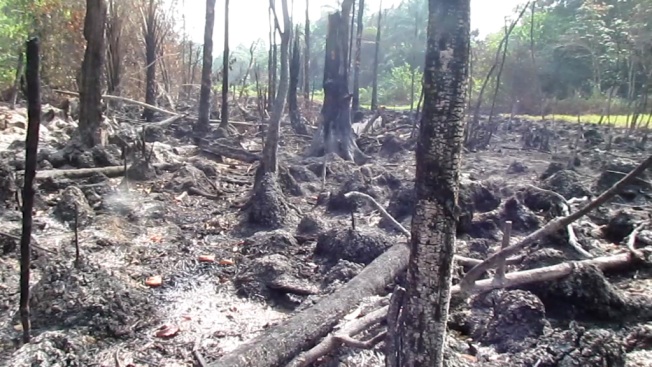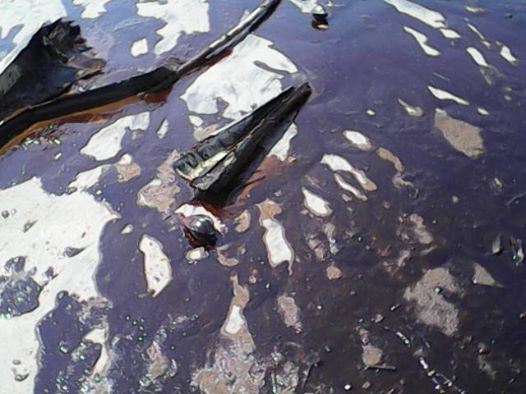
By Nnimmo Bassey
Perhaps the most horrendous crude oil pipeline incident of 2015 was an explosion that occurred on 9 July while repairs of a damaged pipeline was ongoing at Azuzuama, along Nigerian Agip Oil Company’s Tebidabe-Clough Creek route.
The explosion and raging inferno occurred during a Joint Inspection Visit (JIV) embarked on to determine the cause of an ongoing oil spill there. The explosion and ensuing inferno claimed at least fourteen lives, including those of two government officials.
The tragedy was followed by contentious processes of identifying the victims and according them decent burial – a near impossible due to reported reticence of Agip and the fact that some of the victims were burnt to ashes.
In reaction to the Azuzuana tragedy, Iniruo Wills, the Commissioner for Environment in Bayelsa State said, “It is time to declare a State of Emergency on the Environment in the Bayelsa State in particular and the Niger Delta in general, in order to save the lives of our people and the future of our communities.
For the people of Bayelsa State and especially the families of the victims and staff of the Bayelsa State Ministry of Environment, July 2015 will go down as the July of death, on account of the needless deaths inflicted upon our beloved ones and colleagues by the Nigeria’s environmentally irresponsible oil and gas industry… We are grieving, but we must now also insist yet again that it is time to take decisive action to stop this perilous hazard that has become a routine threat to life and ecology in Bayelsa State and the Niger Delta.”
We recall that in 2000, a fire resulting from a faulty machine claimed the lives of eighteen youths that were assisting in repair works along the Agip’s Brass-Ogoda pipeline. On 29 July 2012 another fire erupted along the same company’s pipeline at Ayambele/Kalaba community. At this 2012 incident sixteen persons, including military personnel and community youths narrowly escaped death.
Haphazard treatment of oil spills has remained a worrisome trend in the oil fields of the Niger Delta.
Forests and wetlands have been set on fire as oil companies and their contractors try to hide oil spills. In other instances, attempts have been made to cover up crude oil spills with imported soils or simply by turning the soil at the point of incident. These futile efforts have left horrific environmental scars across the oil field communities of the region.
Several oil spills have been reported by community field monitors. We will pick examples from the last six months.
A major spill occurred on Christmas Day at Agip’s Tebidaba Well 9 at Ikebiri. As the crude spewed into the fragile ecosystem the community was faced with the dilemma of either permitting the oil company to shut down the polluting well or to wait for a JIV before any shut down was permitted.
However, shut down was effected to save the environment. The visit comprising officials from NOSDRA, Agip, security personnel, State Ministry of Environment and community representatives, was conducted on 27 December 2015 only to be declared as inconclusive, to the chagrin of the community. An earlier JIV following a spill that occurred at the same oil well in November 2014 was equally declared to be inconclusive and nothing has been heard of it ever since.
Erosion of confidence in regulatory agencies is extremely dangerous in a highly polluted environment such as the Niger Delta. It should be noted that the equipment used for tests during the JIVs are often provided by the oil companies involved.
Community monitors are rapidly losing confidence in regulatory agencies over their handling of oil spill incidents.
“How do they expect us to have confidence in them if they cannot say the simple truth of what they saw? They are all bad and criminal-minded folks who ought to be neutral but fail to be so. I will never trust the regulators again; whether from NOSDRA, DPR or Ministry of Environment,” fumed a community leader at Ikebiri. Erosion of confidence in regulatory agencies is extremely dangerous in a highly polluted environment such as the Niger Delta.
It should be noted that the equipment used for tests during the JIVs are often provided by the oil companies involved.

Shell notched some spills within the period, notably the ones at Odau community on 2 June 2015 and at Adibawa Well 8 on 12 July 2015. The spill at Odau, in Rivers State, spread to Oruma/Yibama community in Bayelsa State. The spilt crude went up in flames some months later, causing severe environmental damage in the Oruma/Yibama community. These incidents highlight the cross-border nature of environmental pollution and the consequences of environmental impunity.
A significant dimension was also highlighted by the multiple spills close to the Okordia Manifold at Ikarama community on 12 August 2015.
Terror was unleashed on Ikarama community following that spill and some community members including the paramount ruler were arrested and detained. The arrests were peacefully protested by Ikarama women. Disagreement over surveillance contact arrangement between Shell and community youths was fingered in the incidents and resultant conflict.
Crude oil from ExxonMobil’s offshore facilities washed up on the shores of Ibeno, Akwa Ibom State in November 2015 with tales of woes for shoreline communities.
Another Agip spill was noticed by community monitors when they saw spreading crude in the creeks of Emago-Kugbo on 12 July 2015. The spill site was reportedly set ablaze on 25 July. A community a farmer, Dumani Lucky, was burned and choked to death as he attempted to boat through the polluted area to his farm.
A monitor captured the situation this way, “The fire also burnt the barge, tug boat and other equipment mobilized for the clamping by Agip or company contractor. In fact, the tug boat sank and is now only serving as an anchor to the barge. After they set the spill site ablaze the whole community environment was as dark as if there was no sun. People had to stay indoors to avoid the smoke. Visibility only improved from midday. Later that day we had a heavy rainfall and the entire community was flooded with dark water. We don’t know what to do because Agip has been treating us badly for so long a time.”
Death, ecological destruction and inconclusive JIVs portend more harm to the Niger Delta environment.
With the delay in proposed clean-up of the Ogoni environment, no seriousness to halt gas flaring and with the continued piling of more pollution, we have to construct a new ecological consciousness on the part of citizens. This consciousness must necessarily include tough resistance to so-called inconclusive JIVs – a not so clever way of blaming the victims and claiming that oil spills are caused by third party interferences rather than putrid pipelines and ill-maintained equipment.
The new consciousness should include constant monitoring and reporting and insistence on urgent clean-ups and strict liability on the part of polluters.
I intended to share a Happy New Year greeting, but we are concerned about the survival of our environment and peoples. Nevertheless, have a watchful New Year!










